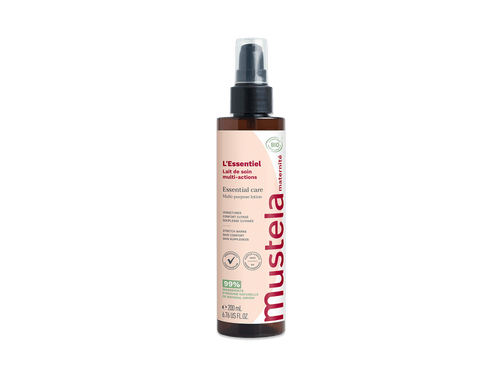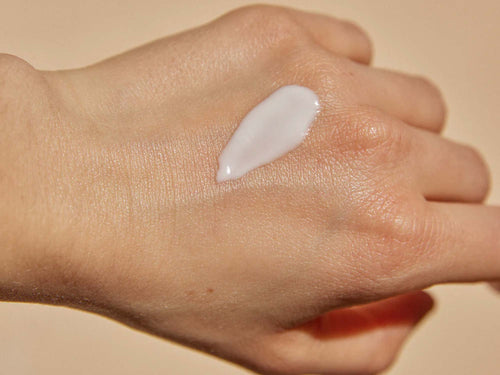
As if pregnancy isn’t already full of changes and new experiences, you’re also anticipating labor and delivery — one of the biggest days of your life! As part of that anticipation, you may be wondering if you need a doula.
At Mustela, we want you to feel equipped to make the best decisions for you and your baby. So, in this article, we’ll go over what a doula is, how they help during labor and delivery, and whether or not you should consider hiring one.
What Is A Doula?

To understand what a doula is, let’s go straight to DONA International, the world’s largest doula certifying organization.
DONA stands for Doulas Of North America, but it’s now an international organization and is commonly known as DONA International.
DONA defines a doula as “a trained professional who provides continuous physical, emotional and informational support to a mother before, during and shortly after childbirth to help her achieve the healthiest, most satisfying experience possible.”
That sums it up, but there’s still plenty more to know about doulas and all the ways they can help a mother in labor. First of all, there are three types of doulas: antepartum, labor, and postpartum.
Antepartum doulas provide assistance to a mother in the months before delivery and are often used for high-risk pregnancies or moms on bed rest.
Postpartum doulas support a new mom in the months after birth by coaching her through new baby care, helping around the house, and providing education and emotional support.
That being said, when people talk about doulas, they’re usually referring to labor doulas, which is what we’ll focus on.
A labor doula is a trained professional, but they aren’t medical professionals. That means they won’t examine you or deliver your baby. Instead, they work with and support the mom (and the whole family) before the baby arrives, during birth, and shortly following delivery.
How exactly do they help and provide support? Let’s take a look.
What Does A Labor Doula Do?

As their name suggests, a labor doula does their main work during the actual labor and delivery process. But their role can be separated into three phases: pregnancy, labor and delivery, and post-delivery.
Here’s a quick explanation of what they do during each stage.
During Pregnancy
In the middle of dealing with stretch marks, backaches, and a growing belly, you’re also likely worried about labor and delivery and everything that comes with it!
Having a doula can help you feel prepared for the big day. A labor doula will meet with you once or twice during your second or third trimester.
They’ll use that time to get to know you, help you create a birth plan, answer your questions about labor and delivery, and equip you with techniques for breathing, relaxation, or pain management.
Expert tip: if stretch marks are particularly concerning to you, help yourself relax by applying Mustela’s Stretch Marks Oil.
Specially formulated with 99% ingredients of natural origin, our fast-absorbing oil hydrates your skin to help prevent the appearance of stretch marks!

During Labor And Delivery
A doula’s biggest role is during your labor and delivery. They’ll be notified when you go into labor and will go to the hospital or birthing center you’ve chosen. Some may also attend a home birth.
During the whole labor and delivery process, your doula will be right by your side! While the doctors and nurses may come and go (or even switch at a shift-change), your doula is with you the whole way.
Your doula won’t actually deliver your baby or even examine you. Instead, they are there to provide emotional and physical support.
They can massage, help you find comfortable positions, and manage pain with alternative options like music, aromatherapy, and the like.
A doula may also act as a go-between for you and the medical staff, advocating for you and your preferences and, if needed, translating the medical jargon into words you can understand!
Keep in mind that a doula doesn’t replace the role of your partner. Instead, a doula is there to encourage both of you and facilitate your partner’s involvement in the whole birth process.

After Delivery
If you have a labor doula, they’ll be with you during delivery and immediately following delivery, then their job is finished.
This is different from the role of a postpartum doula, who doesn’t attend the birth but cares for the new mom in the first few months after birth. So, what will your labor doula do immediately following your baby’s birth?
Shortly after delivery, a doula will help you and your partner make the immediate transition into parenthood. They’ll continue to provide emotional support as you recover from delivery, involving your partner and older children as desired.
A labor doula may also be there to coach you as you begin breastfeeding and caring for your baby.

On a similar note, if you plan on nursing, don’t forget to prepare ahead of time by stocking up on a nipple cream, like Mustela’s Nursing Comfort Balm.
Our soothing balm is made of 100% naturally derived ingredients and enriched with vitamin E to nourish and protect your skin. Pack it in your hospital bag!
How Is A Doula Different From A Midwife?
Especially if this is your first child, it can be hard to understand all the different people that can be involved in the pregnancy and birth processes. How is a doula different from a midwife?
While a doula can be extremely helpful to a woman, they don’t ever take the place of a doctor, nurse, OB, or midwife (or even your partner, as we mentioned earlier!).
A certified midwife is medically trained and can examine you and give birth to your baby.
Doulas, on the other hand, are trained and certified, but they are not trained medical professionals. Their role is to care for and support the mother.
Do You Need A Doula?
Now that you know what a doula does, you’re probably asking yourself whether or not you need one. That’s a great question and one that only you can answer!
The short answer is that you don’t need a doula; you can give birth without one. But doulas provide excellent support for the birthing process. Many women who give birth with a doula present report a more positive delivery experience.
Besides a woman’s perception of her birth experience, studies indicate benefits of using a doula: you may have a shorter labor and are less likely to have a C-section or use pain medication.
As you can see, not only will a doula make you feel supported as you push, they can also help labor and delivery go more smoothly. Plus, they can be invaluable if you’re looking for a more natural experience.
So, while a doula isn’t necessary, they can be quite helpful! Choosing whether or not to have one depends on a few factors, the first being cost.
Doulas either charge hourly or with a flat fee that usually includes a prenatal visit, labor and delivery, and a postnatal visit. Doulas aren’t always covered by health insurance, so if you’re considering one, check to see what’s covered by your insurance plan.
How To Choose A Doula

If you decide to use a doula for your big day, here are a couple of tips to keep in mind when it comes to choosing one.
Research
First of all, if you know other moms who had a doula, ask them who they used and how their experience was.
If you don’t know anyone or want to do your own research, you could start by searching DONA International’s database to find qualified, professional doulas in your city.
Ask Questions
When deciding which doula to hire, ask lots of questions! Ask them about their fees, training, services, and availability.
You’ll also want to be sure that you get along with them since your doula will be walking with you through one of the biggest (and most challenging) days of your life!
Make The Right Decision For You

During pregnancy, childbirth, and postpartum, it’s important to take care of yourself as a mother so you can give the best of yourself to your family! When it comes to labor and delivery, a doula can be an important part of that care.
Now that you know what a doula is, it’s up to you to decide if hiring one is the right choice for you. Every mother is different!
Regardless of what you choose, take small steps to care for yourself with products like Mustela’s Stretch Marks Serum and Nursing Comfort Balm.
Both the big and small aspects of pregnancy and childbirth are important. A healthy birth starts with a healthy mom!










